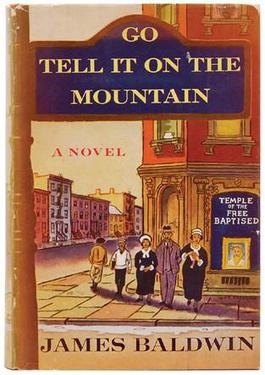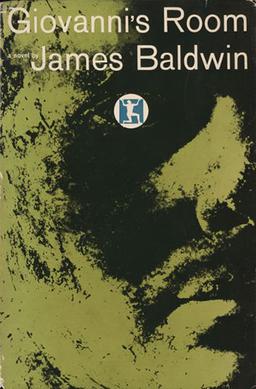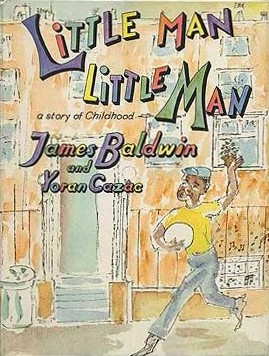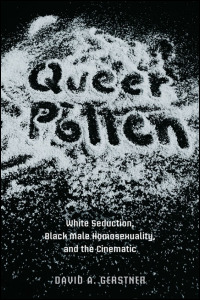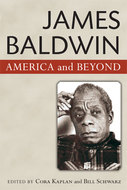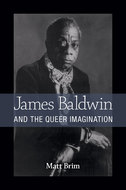Connect with the Libraries
Have an idea for Subject of the Month?
August 2016

Perhaps I did not succumb to ideology, as you put it, because I have never seen myself as a spokesman. I am a witness. In the church in which I was raised you were supposed to bear witness to the truth. Now, later on, you wonder what in the world the truth is, but you do know what a lie is.
Selector: Clayton Hayes
James Baldwin, born in New York City in August of 1924, was one of the most prominent and eloquent speakers, essayists, and novelists of the American Civil Rights Movement. His visionary works attacked American race relations from a psychological perspective, and demonstrated the harm that racial inequality had on both the oppressed and the oppressor. He also struggled with his own sexuality, a theme that was reflected in his fiction and later essays. He has left an indelible mark on the culture of the United States and, indeed, the world, and is cited as a strong influence by many contemporary authors, one of the most prominent of which is Ta-Nehisi Coates. You can read more on Baldwin's life in this short biography, and on his influence on Coates in this article appearing in The Atlantic.
Timeline of Selected Works, Articles, and Interviews
All of these items can also be found elsewhere on this page, and most appear in the Zotero library of resources in this guide.
Zotero Library of Resources on this Guide
List of Resources in this Guide
This Zotero library features most of the resources mentioned in this guide, including a list of the newspaper and magazine written by or featuring Baldwin that are on the timeline. There are folders on the left-hand side of the page you can navigate, and you can change which columns appear in the display by clicking the "Library Settings" icon in the right-hand side of the page, above the list of items in the library.
Online Collections

The Smithsonian has a vast array of materials related to James Baldwin, including photographs and scans of handwritten letters. It also features images of items owned by Baldwin at various points in his life, including during his residence in Turkey and in France.

by Samantha Gibson, Digital Public Library of America
This collection of Digital Public Library of America materials offers some resources to help contextualize the information presented in Baldwin's The Fire Next Time, including photographs, video clips, and excerpts pulled from contemporary sources. It also offers a list of links at the bottom of the page which allow for further exploration.
The Display

James Baldwin in the Library's Collections
Notes of a Native Son
First published in 1955. A collection of ten essays, several of which are revised versions of previously-published magazine articles.
Nobody Knows My Name
First published in 1961. A collection of more of Baldwin's essays, again a combination of previously-published articles and new material.
The Fire Next Time
First published in 1963, and comprised of essays previously appearing in The Progressive and The New Yorker. Hailed as one of the most influential works on race in the civil rights era. Read a contemporary review here.
No Name in the Street
First published in 1976. A reflection on civil rights-era events and people of historical significance, described from Baldwin's point of view.
The Devil Finds Work
First published in 1976. A reflection on his experiences viewing films and a critique of the racism and racial politics found in American cinema.
The Evidence of Things Not Seen
First published in 1985. A discussion inspired by the Atlanta Child Murders of the late 70s and early 80s.
The Price of the Ticket
First published in 1985. A collection of Baldwin's nonfiction writings, spanning from 1948 to 1985.
Go Tell It on the Mountain
First Published in 1953. Baldwin's semi-autobiographical first novel about race, family, and religion. Hailed as one of the best novels of the 20th century.
Giovanni's Room
First Published in 1956. A complex and nuanced story of homosexual and bisexual relationships set against the backdrop of postwar Paris. Read a contemporary review here.
Another Country
First Published in 1962. Baldwin incorporates interracial relationships and sexuality into this story set in New York City's Greenwich Village. Read a contemporary review here.
Going to Meet the Man
First Published in 1965. A collection of Baldwin's short fiction. Read a contemporary review here.
Tell Me How Long the Train's Been Gone
First Published in 1968. Baldwin tells the story of three friends living in Greenwich Village, discussing interracial relationships, bisexuality, and religion, specifically Christianity.
If Beale Street Could Talk
First Published in 1974. The story of a young Harlem couple and their families thrown in to turmoil because of the actions of a racist police officer.
Little Man, Little Man: A Story of Childhood
First Published in 1976. A juvenile fiction book illustrated by Yoran Cazac.
Just Above My Head
First Published in 1976. Stories of the lives of a group of friends first based in Harlem, touching on topics such as war, sexuality, and religion.
The Amen Corner
Originally published in 1954. Baldwin's first play deals with the issues of religion and poverty as related to the African-American experience. See a North Carolina Central University Alumni production of this play here: Part 1, Part 2.
Blues for Mister Charlie
Originally published in 1964. Baldwin's second play explores how religion, specifically Christianity, has contributed to the disenfranchisement of black America.
A Rap on Race
Originally published in 1971. Transcriptions of a conversation between Baldwin and Dr. Margaret Mead, a prominent cultural anthropologist.
One Day, When I Was Lost
Originally published in 1972. A short screenplay based on Alex Haley's The Autobiography of Malcolm X.
A Dialogue
Originally published in 1973. A conversation between Baldwin and Dr. Nikki Giovanni, transcribed from their interview on the television program Soul!
Jimmy's Blues
Originally published in 1983. The only collection of Baldwin's poetry that he published during his lifetime.
Conversations with James Baldwin
Originally published in 1989. A collection of interviews with James Baldwin, covering the period of 1961 to 1987.
Native Sons
Originally published in 2004. Correspondences between James Baldwin and Sol Stein, a fellow author and high school friend of Baldwin's.
Vintage Baldwin
Originally published in 2004. A collection of prominent works by Baldwin, featuring short stories, essays, and excerpts.
James Baldwin
by Louis H. Pratt
Originally published in 1978. Provides contemporary commentary and criticism of Baldwin during the author's lifetime.
James Baldwin
edited by Harold Bloom
Originally published in 1986. Provides commentary on both Baldwin and his works from contemporary scholars and critics.
Stealing the Fire
The Art and Protest of James Baldwin, by Horace A. Porter
Originally published in 1989. An analysis of Baldwin's work pre-1963 and his transformation into an activist.
James Baldwin Now
edited by Dwight A. McBride
Originally published in 1999. A group of scholars considers Baldwin's relevance to social and political discourse at the close of the 20th century.
James Baldwin and Toni Morrison
Comparative Critical and Theoretical Essays, edited by Lovalerie King and Lynn Orilla Scott
Originally published in 2009. This collection of essays explores the literary relationship between Baldwin and Toni Morrison. An eBook version of this title is also available.
The Shadow and the Act
Black Intellectual Practice, Jazz Improvisation, and Philosophical Pragmatism by Walton M. Muyumba
Originally published in 2009. This book explores themes related to Jazz improvisation in the writing of Baldwin and contemporaries Henry Ellison and Amiri Baraka.
Queer Pollen
White Seduction, Black Male Homosexuality, and the Cinematic, by David A. Gerstner
Originally published in 2011. This work explores the lives of three prominent black queer 20th Century artists: Baldwin, painter and writer Richard Bruce Nugent, and filmmaker Marlon Riggs.
James Baldwin: America and Beyond [eBook]
edited by Cora Kaplan and Bill Schwarz
Originally published in 2011. This work is an interdisciplinary examination of the many facets of Baldwin by leading writers in various fields.
James Baldwin and the Queer Imagination [eBook]
by Matt Brim
Originally published in 2014. The central figure in black gay literary history, James Baldwin has become a familiar touchstone for queer scholarship, and this book critically engages with and complicates the project of queering Baldwin and his work.
Letter to Jimmy [eBook]
On the Twentieth Anniversary of Your Death, by Alain Mabanckou; translated by Sara Meli Ansari
Originally published in 2014. Written on the twentieth anniversary of Baldwin's death, this work is African writer Alain Mabanckou's attempt to contextualize Baldwin's work from an African viewpoint.
Videos
I Am Not Your Negro
This Oscar-nominated documentary considers Baldwin's unfinished project Remember This House, a personal examination of three assassinated black civil rights leaders: Medgar Evers, Malcolm X, and Dr. Martin Luther King, Jr. It juxtaposes archival footage of Baldwin, written works by the author, and contemporary racial struggles in American society.
James Baldwin: The Price of a Ticket
A documentary that uses archival footage to explore Baldwin's life from the Harlem of the 30s, his father's fundamentalist church and the emigre demimonde of postwar Paris to his running commentary on the drama of the Civil Rights movement.
The Legacy of James Baldwin
Following a screening of the above documentary, James Baldwin: The Price of the Ticket, the filmmaker Karen Thorsen; Tufts professor Peniel Joseph; poets Nikky Finney and Rose Styron; and James Baldwin's niece, Aisha Karefa-Smart, discussed his call for equality and its relevance today. Kim McLarin moderates.
James Baldwin from "The Negro and the American Promise"
Part of Henry Morgenthau III's program "The Negro and the American Promise," which also featured Martin Luther King Jr. and Malcolm X, was described by the New York Times as "a television experience that seared the conscience."
James Baldwin debates William F. Buckley, Jr., at Cambridge University
James Baldwin debated against William Buckley in a historical debate at the Cambridge Union on the motion "Has the American Dream Been Achieved at the Expense of the American Negro". The house voted overwhelmingly in favour of the motion.


